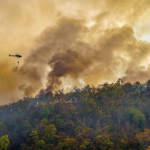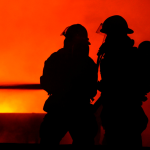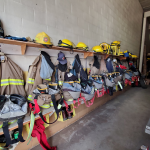Witchcraft is often thought of as the use of magical powers, that witches are an agent of the devil and that witches use their powers to harm people and property. Witchcraft is one way of explaining human misfortune by a supernatural power or person in the community. Recently conclusions reached by fire investigators have been compared to witchcraft in that they are based on beliefs and myths that will not stand up to rigorous scientific scrutiny.
Perhaps the most dramatic example of the acceptance of non-scientific evidence is the Todd Willingham case in Texas. Mr. Willingham (pictured at left) was tried, convicted and executed for setting a fire in which his three young children perished. Some of the most respected and best educated fire investigators in the USA came forward in defense of Mr. Willingham but their efforts were to no avail. On February 17, 2004 Mr. Willingham was executed.
The evidence used to convict Mr. Willingham included out of date assumptions like the crazing of glass and pour patterns which have been scientifically proven not to support the concept of deliberately set fires.
Could this happen in Canada? Of course not, as we abolished the death penalty years ago. There is a greater chance, however, of negative financial implications on the insured if the fire investigation findings point to the possibility of a deliberate act or the findings are undetermined. The insurance company may withhold paying the claim, forcing the insured to take legal action to attempt recovery of their loss.
Responsibility for fire investigation in British Columbia is mandated by the Fire Services Act (FSA). The FSA requires the Fire Commissioner to investigate fires as deemed advisable and delegates responsibility to Local Assistants to the Fire Commissioner (LAFC) to investigate all fires that occur in their jurisdiction in “a general way”.
LAFC are appointed under the FSA and include municipal fire chiefs and others appointed by the Fire Commissioner. Where no LAFC is appointed the responsibility for fire investigation defaults to the local police, usually the RCMP. Again the investigato’rs obligation is to investigate in “a general way”.
Investigation “in a general way” has been interpreted to mean that the fire investigator (LAFC) has enough information to complete the report form provided by the Office of the Fire Commissioner (OFC).
This is where the problem or potential problem starts. The OFC staff and LAFC are given very limited resources to conduct any more than a cursory review of the fire scene. Only the largest jurisdictions have full time fire investigators assigned to the task. In many career fire departments staff are given limited time to devote to fire investigation as there are many other demands placed on their time. Fire investigators are usually pressured to complete the investigation quickly and to move on to other pressing issues. Smaller jurisdictions often rely on volunteers or paid on call members to perform fire investigation duties.
To perform a thorough fire investigation, resources such as heavy equipment, technical experts and extensive security may be required. In most cases these resources are expensive and beyond normal scope of practice of the local jurisdiction so the LAFC must ask the insurance company to provide them. Many LAFC see this as a conflict of interest and terminate the investigation at that point. In some cases the LAFC will continue with a joint investigation with the insurance company investigator.
The bottom line is that most in-depth fire investigations are performed by private investigators hired by the insurance industry. The insurance industry is in a position to provide the necessary resources to conduct an in-depth investigation. The obvious problem with this is “expectation bias”. Is there an expectation placed on the fire investigator by the company that hires them?
“Expectation Bias”, also known as “Observer Bias”, is the tendency for people to find evidence that agrees with their expectations for the outcome of the investigation. Unconsciously, people tend to look for and find evidence that supports their anticipated conclusions. Most experienced fire investigators will agree that if they are looking for evidence of arson they will find it.
Expectation bias is not limited to private investigators however. Often, when the LAFC arrives at a scene to investigate a fire a police officer is there as part of the initial response team. However, if the LAFC is met by one or more police officers from a major crime unit it could be interpreted that the scene is already suspected of being, or has determined to be, a crime scene. It is critically important the LAFC keep an open mind during the fire investigation so the fire cause findings are not subject to expectation bias.
There are a number of factors that affect fire investigation practices, including:
“¢ Lack of Resources
“¢ Less Fires
“¢ Limited Training
“¢ No adherence to standards.
The BC Office of the Fire Commissioner has seen dramatic changes over the past decade. The number of full time staff that once devoted a considerable portion of their working hours to fire investigation has been reduced to the point of near elimination. At one time the LAFC could call upon OFC fire investigators to assist with fire investigations that involved major dollar loss fires, fire death and injury investigations, suspicious fires or fires where the cause could not be determined. The LAFC can still call for assistance but it is unlikely a skilled investigator with sufficient resources to conduct a thorough fire investigation will be provided.
The number of fires per capita reported to the OFC has declined significantly. This means there are fewer incidents to investigate ergo less opportunity for LAFC to practice existing skills or develop new investigative techniques.
The police are developing fire investigative resources but their interest is limited to incidents where a crime has taken place. Approximately 70% of all reported fires in BC are determined to be accidental so the police have limited interest in these events.
Many LAFC fire investigators voluntarily participate in fire investigation training programs but this is not a mandated requirement. Neither is there any requirement for further professional development but some continuing education opportunities are available but the cost is born by the LAFC or the agency or jurisdiction they represent.
The bottom line is that there is limited investigation by truly independent fire investigators. There are many case histories where the insurance company refused to pay the insured based on the findings of the fire investigators. In these cases it is up to the insured to initiate legal action against the insurance company in the hopes of recovering their loss.
If there are any unanswered questions about the cause of a fire the insured would be well advised to contact a lawyer and hire their own fire cause and origin expert early in the investigation so their interests are in the forefront of at least one fire investigator. It could be a mistake to think that the LAFC/ public fire investigator has the support, time or resources to perform an in-depth investigation.
Bob Turley spent over twenty-three years with the BC Office of the Fire Commissioner and retired from the position of Deputy Fire Commissioner, Operations. He currently teaches all levels of fire investigation training in British Columbia.








